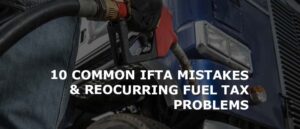
What Are CSA Scores and How Do I Check CSA Driver Scores?
For a CSA score check, login to the FMCSA’s Safety Management System (SMS) website with your DOT number and DOT pin. This allows you to
English proficiency is no longer a compliance issue you can afford to ignore.
As of August 2025, strict federal and state enforcement of English Language Proficiency (ELP) laws for commercial drivers is reshaping the trucking industry.
Carriers that don’t take immediate action risk fines, out-of-service orders, operational delays, and increased audit scrutiny.
This guide breaks down everything you need to know, including key timelines, enforcement changes, training tips, and how CNS Companies can help you stay compliant with our English Proficiency Readiness Course.
Federal law under 49 CFR § 391.11(b)(2) has always required drivers to be able to read, write, and speak English well enough to:
But inconsistent enforcement allowed many fleets to bypass this requirement — until now.
Recent high-profile crashes tied to communication barriers have made English proficiency a safety and compliance priority for the Federal Motor Carrier Safety Administration (FMCSA) and state enforcement agencies.
Key Actions from the Executive Order:
Then, on May 1st, Commercial Vehicle Safety Alliance (CVSA) voted to make a lack of English proficiency part of the out-of-service criteria for truckers.
Supporting America’s Truckers and Roadway Safety
President Trump’s order highlights that:
Trump emphasized that ensuring English proficiency is critical not only for safety but also to support the livelihoods of America’s trucking community.
States Follow Suit: Fines and Penalties
While enforcement efforts have faced criticism over potential profiling, both federal and state regulators emphasize that a basic command of English is essential for roadway safety and regulatory compliance.
Following the federal move, states are beginning to strengthen their own enforcement:
While no other states have enacted specific fines for English proficiency violations, enforcement actions have occurred:
|
Date |
Change or Action |
|
April 2025 |
President Trump signs Executive Order enforcing strict ELP standards. |
|
May 1, 2025 |
CVSA votes to add ELP violations to the out-of-service criteria. |
|
June 25, 2025 |
Out-of-service enforcement begins nationwide for ELP violations. |
|
August 25, 2025 |
Enforcement ramps up in multiple states, including Pennsylvania. |
|
September 2025 |
Heightened audits and roadside inspections across California, Washington, and New Mexico as FMCSA threatens to withhold millions in funding over poor compliance. |
FMCSA’s two-step roadside inspection process now standardizes how officers evaluate English skills:
Step 1: Initial English Interaction
Drivers must start every inspection in English. If communication fails, a formal assessment begins.
Step 2: English Proficiency Assessment
Result: Failing either step can mean an immediate out-of-service order, leaving your truck and freight stranded until a compliant driver arrives.
New Penalties: Out-of-Service Orders Now in Effect
Beginning June 25, 2025, the Commercial Vehicle Safety Alliance (CVSA) will include ELP violations in the North American Standard Out-of-Service Criteria.
If a driver is cited for ELP non-compliance:
“America First means safety first,” said Secretary Sean Duffy. “This common-sense change ensures the penalty for failure to comply is more than a slap on the wrist.”
Border Zone Exception
FMCSA clarified that while drivers operating in border commercial zones (such as along the U.S.-Mexico border) can be cited for ELP violations, inspectors should not place these drivers out-of-service or pursue disqualification at this time.
Hearing-Impaired Driver Exemption
Drivers with a hearing exemption under 49 CFR § 391.41(b)(11) will not be deemed unqualified under the ELP rule solely for being unable to communicate orally in English.
Several states have already escalated enforcement:
If you’re a carrier or driver operating in or through Florida, expect stricter inspections starting immediately.
The state is adding immigration enforcement and English proficiency checks at all agricultural interdiction stations, in addition to their standard inspections.
What’s Changing
Florida’s agricultural inspection stations—separate from FDOT weigh stations—are now being used as enforcement points to identify unsafe or unauthorized drivers.
Key updates include:
There are 23 inspection stations across the state, with 100% of Florida Department of Agriculture and Consumer Services (FDACS) officers now certified to enforce these new measures.
Why the Crackdown?
This move follows a fatal crash on the Florida Turnpike involving a driver who:
Florida Attorney General James Uthmeier stated:
“If you’re here illegally or can’t speak English, you have no business operating large commercial vehicles on Florida’s roads.”
Florida has also asked the FMCSA to audit and potentially decertify CDL programs in California and Washington for issuing licenses in violation of federal safety rules.
Why This Matters to Carriers and Drivers
If your fleet operates in Florida, these inspections could impact operations, delay deliveries, and result in costly violations.
You must ensure:
Funding at Risk: FMCSA Warns Carriers in CA, WA, and NM Over Lax English Proficiency Oversight
With millions of dollars in federal safety funding at risk, carriers in California, Washington, and New Mexico should expect heightened inspections, stricter enforcement, and potential operational disruptions in the weeks ahead.
These three states have been issued a Notice of Proposed Determination of Non-Conformity for failing to adequately enforce federal rules that require commercial drivers to speak, read, and understand English well enough to safely operate a commercial motor vehicle (CMV).
If these states do not comply within 30 days, the FMCSA is prepared to withhold all federal funding under the Motor Carrier Safety Assistance Program (MCSAP) — totaling:
Here’s what this means for carriers operating in these states and what steps fleets should take to protect their operations.
According to FMCSA data:
Transportation Secretary Sean Duffy made it clear: states that do not bring their enforcement efforts in line with federal requirements will lose their MCSAP funding, jeopardizing millions of dollars allocated to safety programs.
Non-compliance doesn’t just risk fines — it threatens your operations, safety scores, and reputation. Carriers can expect:
Why This Matters to Carriers and Drivers as Florida Increases English-Proficiency and Immigration Enforcement for Truck Drivers
If your fleet operates in Florida, these inspections could impact operations, delay deliveries, and result in costly violations.
You must ensure:
What Fleets Should Do Now
To stay compliant and avoid downtime:
What This Means for Carriers in CA, WA, and NM Over Lax English Proficiency Oversight
For carriers operating in these states, the combination of heightened scrutiny and potential funding cuts could have immediate operational impacts:
Expect increased inspections and more thorough checks for compliance with ELP rules. Drivers may face additional questioning during stops to verify their ability to:
If states lose their MCSAP funding, their ability to staff roadside enforcement and compliance programs could be disrupted. This could lead to:
A loss of state funding could shift more authority to federal enforcement officers, who may implement a stricter interpretation of ELP compliance standards, leaving carriers little room for error.
Carriers that fail to ensure drivers meet English proficiency requirements could face:
Carriers should act now to stay ahead of enforcement:
Audit Your Driver Roster
Update Your Hiring Practices
Invest in Training
Drivers for whom English is a second language should take part in structured language courses, such as our English Proficiency Readiness Course. This ensures they’re road-ready and compliant before inspections.
Here are actionable ways to prepare drivers for success:
Ongoing Support
Provide language tools, mentorship, and follow-up assessments every quarter.
Our course is designed for fleets and drivers who need a fast, effective path to compliance.
Key Benefits:
With stricter federal oversight and immediate out-of-service penalties, compliance is not optional. Proactive training protects your fleet from violations, improves safety, and ensures your operations run smoothly in every state.
Stay ahead of enforcement changes. Call 888.260.9448 or email info@cnsprotects.com to schedule your testing and training today.
This course is designed for motor carriers and commercial drivers who need to assess, strengthen, or verify English language skills. It covers the key areas of verbal and reading comprehension required during roadside inspections, including how to clearly communicate with law enforcement officers, understand road signs and traffic control devices, and discuss essential trip details and vehicle operations.
Whether you’re a motor carrier building a safer fleet or a driver preparing for inspections, this course ensures you’re equipped to meet the updated requirements and keep moving forward—safely, legally, and confidently.

For a CSA score check, login to the FMCSA’s Safety Management System (SMS) website with your DOT number and DOT pin. This allows you to

Fuel tax recordkeeping and reporting mistakes can bring on an IFTA audit. Does your trucking company travel across state lines? Then you may have heard

How to keep getting loads and not get dropped by your freight broker. If you were recently audited and received a conditional or unsatisfactory rating,

If you have been in the trucking industry for some time, then you know that some violations have more consequences than others. Negative roadside trends

Examining problems is crucial for your fleet’s growth. Here’s how to do it. Let’s get real for a second. If you don’t examine your failures,

In 2019, FMCSA data shows that nearly half of the 54,000 DataQs were filed for inspections/crashes assigned to the wrong carrier or driver (for example,

The total number of DOT audits and off-site audits are expected to increase 50% in 2021, compared to last year. The Federal Motor Carrier Safety

Did you receive an email or phone call requesting an FMCSA safety audit or comprehensive compliance review? What is an FMCSA Safety Audit or Compliance

Any time a driver is placed out-of-service at roadside, it increases the chances of a company audit. While a safety audit can occur at any

All fleets should be proactive, not reactive, when it comes to DOT compliance and safety management Fleets that say they care about putting “safety first”

In 2020, the FMCSA and state enforcers may have conducted over 50% of all compliance reviews remotely where just 10% were conducted in 2019 and

Are you prepared for an IFTA Audit? When it comes an audit, the best defense is a great offense. And the best offense is knowledge.